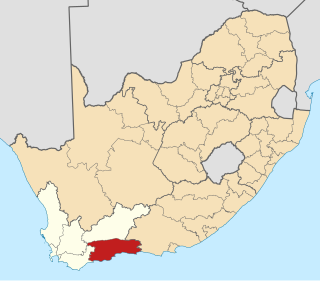
Plettenberg Bay, nicknamed Plet or Plett, is the primary town of the Bitou Local Municipality in the Western Cape Province of South Africa. As of the census of 2001, there were 29,149 population. It was originally named Bahia Formosa by early Portuguese explorers and lies on South Africa's Garden Route 210 km from Port Elizabeth and about 600 km from Cape Town.

The Clatsop Plains are an area of wetlands and sand dunes between the Northern Oregon Coast Range and Pacific Ocean in northwestern Oregon in the United States. They stretch from near the mouth of the Columbia River south to the vicinity of Tillamook Head near Seaside. The plains are drained by several coastal rivers include the Skipanon River and the Necanicum River, which flow parallel to the coast and empty into the Columbia at Youngs Bay near Astoria and into the Pacific Ocean near Seaside respectively. At the time, the Lewis and Clark expedition recorded a different river draining the plains which entered the Pacific near the current day Camp Rilea Armed Forces Training Center. Research, 200 years later in 2005, seems to have confirmed this by locating an old river channel.
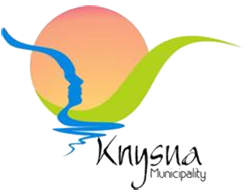
Knysna Local Municipality is a municipality part of Garden Route District Municipality located in the Western Cape Province of South Africa. As of 2011 the population is 68,659. Its municipal code is WC048.

Native plants are plants indigenous to a given area in geologic time. This includes plants that have developed, occur naturally, or existed for many years in an area.
Sir Jahleel Brenton, 1st Baronet, KCB was a British admiral born in Newport, Rhode Island, British North America.
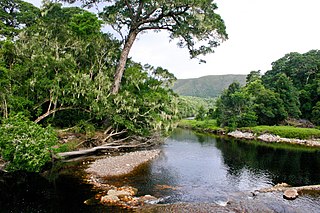
The Knysna-Amatole montane forests ecoregion, of the Tropical and subtropical moist broadleaf forests Biome, is in South Africa. It covers an Afromontane area of 3,100 square kilometres (1,200 sq mi) in South Africa's Eastern Cape and Western Cape provinces.

The Tsitsikamma National Park is a protected area on the Garden Route, Western Cape and Eastern Cape, South Africa. It is a coastal reserve well known for its indigenous forests, dramatic coastline, and the Otter Trail. On 6 March 2009 it was amalgamated with the Wilderness National Park and various other areas of land to form the Garden Route National Park.
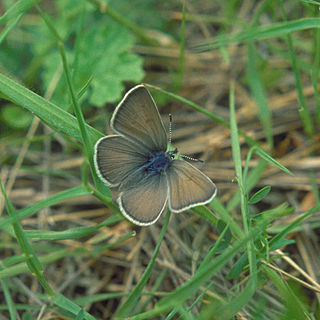
Fender's blue butterfly is an endangered subspecies of butterfly endemic to the Willamette Valley of northwestern Oregon, United States. The subspecies was first documented in the 1920s and was described to science in 1931 by biologist Ralph Macy. He named it for his friend, Kenneth Fender, an entomologist and mail carrier. The subspecies was not seen after the 1930s and was presumed extinct. Small populations were rediscovered in 1989. Its eponym, Fender, had died nine years earlier. In January 2000, Fender's blue butterfly was added to the Endangered Species List by the U.S. Fish and Wildlife Service. The largest known populations now exist in the Baskett Slough National Wildlife Refuge. A 2014 study reintroduced this subspecies to William L. Finley National Wildlife Refuge. The potential range of the butterfly extends from south and west of Portland, OR to south of Eugene, OR.

Wilderness is a seaside town on the Garden Route of the southern Cape in South Africa.

Nature's Valley is a holiday resort and small village on the Garden Route along the southern Cape coast of South Africa. Nature's Valley lies between the Salt River, the foothills of the Tsitsikamma Mountains, the Indian Ocean and the Groot River lagoon. Nature's Valley has a balmy climate and is surrounded by the de Vasselot Nature Reserve which is part of the Tsitsikamma Park, and in turn part of the Garden Route National Park.

The wildlife of South Africa consists of the flora and fauna of this country in southern Africa. The country has a range of different habitat types and an ecologically rich and diverse wildlife, vascular plants being particularly abundant, many of them endemic to the country. There are few forested areas, much savanna grassland, semi-arid Karoo vegetation and the fynbos of the Cape Floristic Region. Famed for its national parks and big game, 297 species of mammal have been recorded in South Africa, as well as 858 species of bird and over 20,000 species of vascular plants.

Thestor brachycerus, the Knysna skolly, is a species of butterfly in the family Lycaenidae. It is endemic to South Africa.
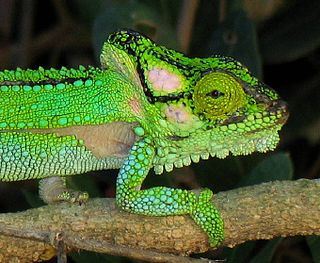
The Knysna dwarf chameleon is a species of dwarf chameleon in the Bradypodion genus that is endemic to South Africa. It is a forest dweller, found only in a limited range in the afromontane forests near Knysna, South Africa, and in certain surrounding areas.

The Garden Route National Park is a national park in the Garden Route region of the Western Cape and Eastern Cape provinces in South Africa. It is a coastal reserve well known for its indigenous forests, dramatic coastline, and the Otter Trail. It was established on 6 March 2009 by amalgamating the existing Tsitsikamma and Wilderness National Parks, the Knysna National Lake Area, and various other areas of state-owned land.
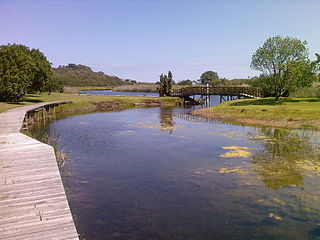
Wilderness National Park, also called the Wilderness Section, is located around the seaside town of Wilderness between the larger towns of George and Knysna, in the Western Cape. It is a protected area of South Africa forming part of the Garden Route National Park.

Buffelsbaai is a small seaside village 20 kilometres from Knysna in the Garden Route District Municipality in the Western Cape province of South Africa. The village is named after Buffelsbaai which stretches east of the village.
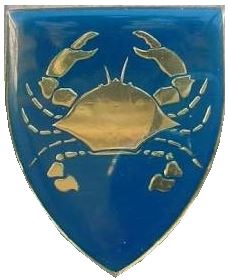
Knysna Commando was a light infantry regiment of the South African Army. It formed part of the South African Army Infantry Formation as well as the South African Territorial Reserve.


